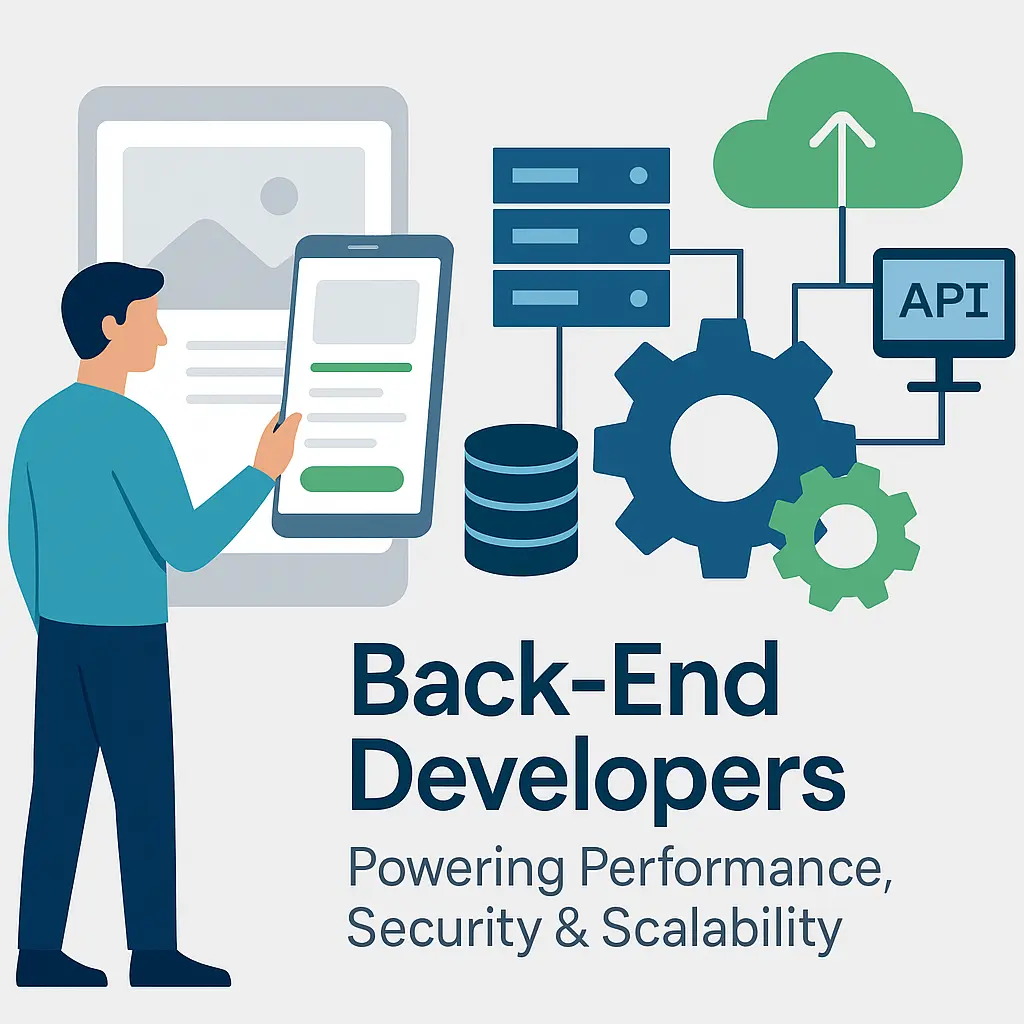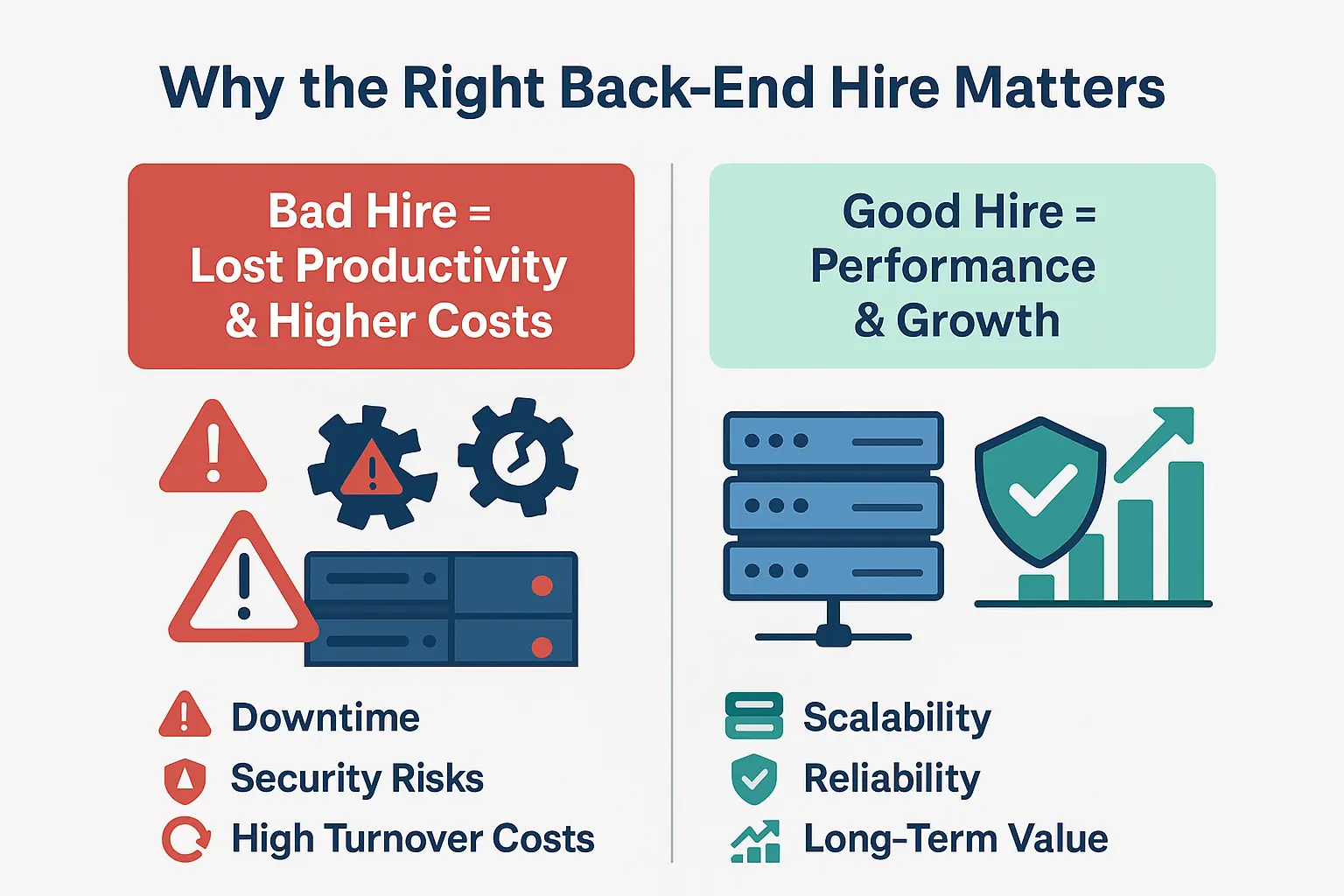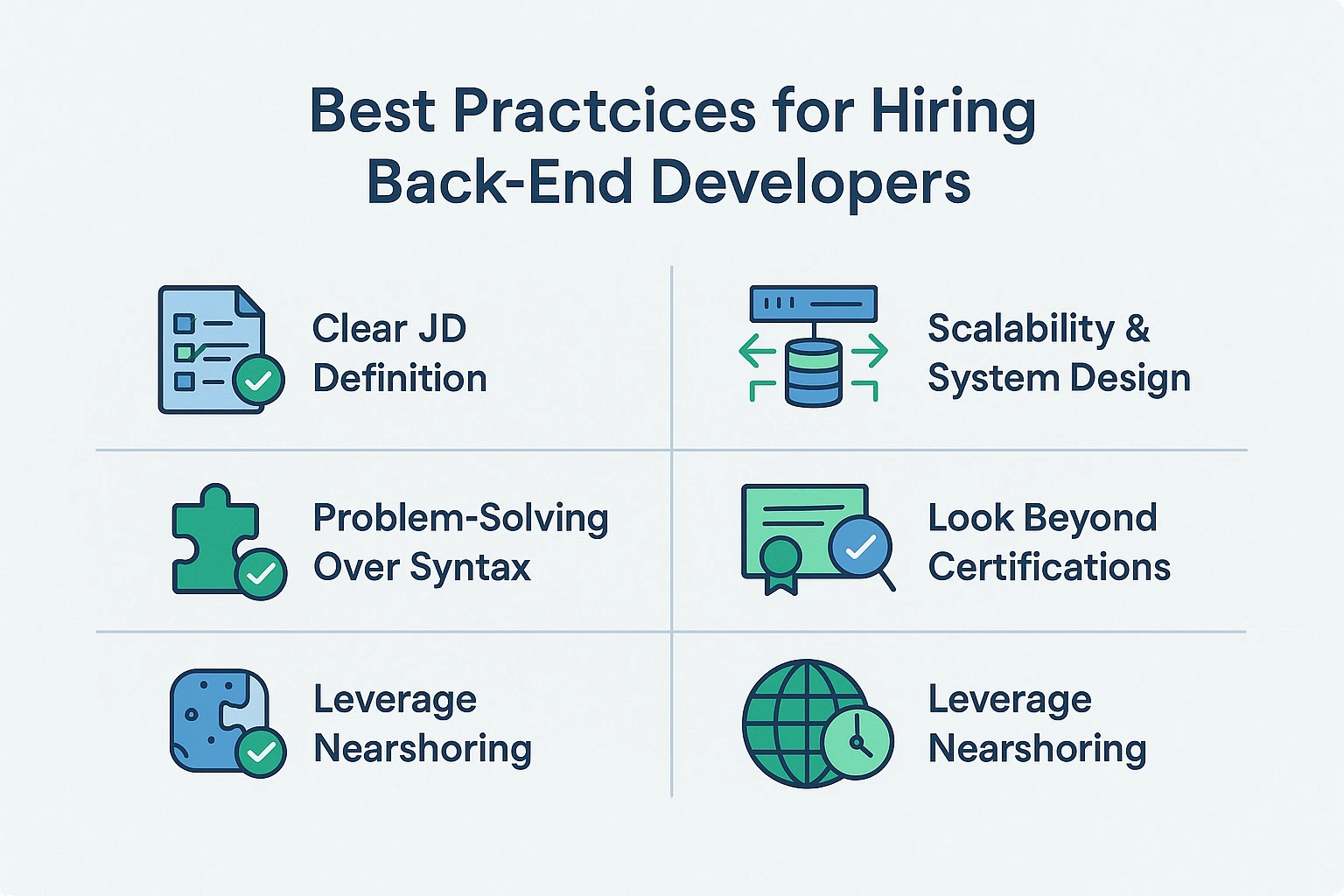Behind every successful application lies a robust back end. While front-end developers craft the user interface, it's the back-end developers who engineer the critical systems that power everything: managing databases, implementing security protocols, and building scalable infrastructures that grow with increasing traffic.
In 2025, the demand to hire back-end developers is at an all-time high. Organizations are transitioning to microservices, containerized environments, and cloud-native architectures—all requiring specialized software development expertise. Today's back-end software engineers must do more than code; they need comprehensive knowledge of system design, database optimization, cybersecurity frameworks, and seamless API integrations.
This makes hiring back-end developers a crucial strategic decision for any software project requirement. A senior developer with strong back-end skills ensures applications remain resilient and scalable; conversely, an unsuitable hire can result in performance issues, expensive rewrites, and potential security breaches. According to the U.S. Bureau of Labor Statistics, employment of software developers is projected to grow by 25% between 2022 and 2032—significantly outpacing average occupation growth rates. Within this expanding field, back-end developers represent one of the most competitive and sought-after segments of the talent market.
For companies across North America, the challenges to hire developer talent are compounded by severe talent shortages and escalating salary expectations. This is why many organizations are now turning to Latin America, where back-end software engineers are not only technically proficient but also bilingual, culturally aligned with North American work practices, and available at more competitive compensation rates.
This comprehensive guide explores the essential skills, tools, and best practices you need to know when looking to hire back-end developers—complete with insights from BetterWay Devs' extensive candidate database, giving you visibility into the real software engineering talent available for your next project requirement.

Why Hiring the Right Back-End Developers Matters
Back-end development forms the foundation of any application. While users rarely interact with it directly, the quality of the back end determines how fast, reliable, and secure a system is. A poorly built back end may initially "work," but under real-world traffic conditions, it can collapse—leading to downtime, poor customer experience, and expensive fixes that require dedicated developer resources.
The Cost of a Bad Hire
Hiring the wrong software developer for your back-end needs can be one of the most costly mistakes a company makes. Research from the Society for Human Resource Management (SHRM) estimates the cost of a bad hire can reach 5x the employee's annual salary once you account for recruitment costs, lost productivity, team disruption, and rehiring expenses. For a mid-level developer earning $100,000 annually, that could mean a $500,000 loss to your project budget.
Strategic Role in Scalability and Security
Skilled developers specializing in backend technologies make architectural decisions that directly affect scalability. Should the application use microservices or a monolithic design? Which database fits best for long-term growth? How should authentication be structured to prevent vulnerabilities? These are not just coding questions—they are business-critical decisions that impact revenue and customer trust that every project manager must consider.
For example:
- E-commerce: A poorly optimized database query could slow down checkout, leading to abandoned carts and lost revenue.
- Fintech: A security flaw in authentication could compromise sensitive user data and damage brand reputation.
- SaaS: Inadequate system design could make scaling impossible without a full rebuild, requiring significant additional investment.
Competitive Hiring Market
According to Stack Overflow's 2024 Developer Survey, 62% of developers identify as back-end or full-stack, making it one of the largest and most competitive hiring areas in tech. But demand still outpaces supply, especially for roles requiring cloud expertise, advanced security knowledge, or experience with multiple backend technologies and programming languages.
This is why companies are increasingly turning to specialized recruiting partners. At BetterWay Devs, we focus on sourcing and validating back-end talent across Latin America—helping project managers avoid costly mis-hires while ensuring they onboard dedicated developers ready to contribute from day one.

Essential Technical Skills for Hiring Backend Developers
When looking to hire a skilled backend developer, you need more than just someone familiar with a single programming language. Top backend talent combines deep technical expertise with problem-solving abilities that enable them to adapt to complex, evolving technical environments. Here are the core competencies every hiring manager should evaluate when building their development team.
1. Programming Languages Proficiency
Effective backend roles require mastery of at least one primary language, with the versatility to adopt others as project requirements evolve:
- Java – Preferred for enterprise-grade applications, banking systems, and robust backend infrastructures.
- Python – Sought after for rapid development cycles, data processing, AI integration, and scalable web services.
- Node.js (JavaScript/TypeScript) – Essential for mobile app developers building real-time applications, microservices, and high-performance APIs.
- PHP – Remains fundamental in web development ecosystems, particularly when hiring PHP developers familiar with modern frameworks like Laravel and Symfony.
- .NET (C#) – Critical for organizations leveraging Microsoft technology stacks and enterprise solutions.
- Ruby – Valuable for Rails developers and startups prioritizing development speed and convention over configuration.
- Golang – Increasingly in demand for cloud-native architectures and performance-critical backend services.
Explore our detailed technical skills guides: Python Developers, PHP Developers, Node.js Developers, and hiring specialized tectalent.
2. Frameworks
Frameworks speed up development by providing structure and reusable components. Examples include:
- Spring Boot (Java) for enterprise-grade microservices.
- Django (Python) for rapid prototyping and scalability.
- Express.js (Node.js) for lightweight APIs.
- Laravel (PHP) for robust web applications.
- .NET Core for cross-platform development.
3. Databases
Back-end developers should be fluent in:
- SQL databases: PostgreSQL, MySQL, SQL Server (structured data, relational queries).
- NoSQL databases: MongoDB, Redis, Cassandra (unstructured data, scalability).
- Strong candidates also know query optimization—a vital skill for applications that handle millions of transactions.
4. APIs and Integrations
Back-end engineers connect systems together. Knowledge of REST, GraphQL, and SOAP APIs is key. Developers must understand authentication (OAuth, JWT) and how to integrate with third-party services securely.
5. Security and Scalability
From encryption protocols to vulnerability prevention (OWASP Top 10), back-end developers need to build systems that are secure by design. They should also understand load balancing, caching, and microservices for scalability.
6. Cloud and DevOps Knowledge
Modern applications demand cloud fluency:
- AWS, Azure, GCP
- Docker, Kubernetes for containerization and orchestration
- CI/CD pipelines to automate deployments
7. Soft Skills
Technical ability alone isn’t enough. Back-end developers must:
- Communicate effectively with front-end, DevOps, and product teams.
- Adapt to evolving tech stacks.
- Solve problems beyond just writing code.
With these skills in mind, companies can filter candidates not just on paper qualifications but on the practical expertise that drives system performance and long-term scalability.
Comprehensive Tools for Evaluating a Backend Developer
Even the most impressive résumé doesn't accurately predict how a backend developer will perform on real projects. To make informed hiring decisions, engineering teams need comprehensive evaluation methods that balance technical expertise with practical problem-solving abilities and cultural alignment for your backend development team.
1. Technical Assessments for Backend Systems
The initial evaluation typically involves a coding challenge or take-home assignment. The key is designing assessments that mirror real-world backend system challenges rather than abstract coding puzzles.
- Example: "Design and build a REST API that implements secure authentication and efficiently handles 10,000 concurrent requests."
- Look for: clean code architecture, comprehensive error handling, scalability approaches, and performance efficiency—not just functional output.
While many organizations utilize platforms like Codility, HackerRank, or CodeSignal, experienced engineers know the most effective evaluations are specifically tailored to your technology stack and business requirements.
2. Code Review Exercises for Java and Python Developers
Beyond writing functional code, exceptional backend developers produce maintainable code. Code review exercises challenge candidates to evaluate existing code snippets and recommend improvements—a critical skill for any software engineer.
- What skilled developers should identify:
- Code readability and consistent naming conventions
- Performance optimizations and resource management
- Security vulnerabilities (e.g., SQL injection, authentication flaws)
- Modularity, reusability, and adherence to design patterns
This assessment reveals whether the developer can think strategically about long-term system maintainability—essential for sustainable backend development.
3. Cultural and Communication Evaluation
Backend software engineers rarely work in isolation—they collaborate with frontend developers, DevOps engineers, QA specialists, and product managers. Behavioral interviews help uncover how candidates:
- Communicate complex technical concepts in accessible terms
- Navigate disagreements regarding architecture decisions
- Approach legacy codebases and manage technical debt
Revealing question: "If you join a team with an outdated monolithic backend system that leadership wants to modernize, how would you approach this transformation as a senior developer?"
4. Expert Technical Validation
At BetterWay Devs, every Python developer, Java developer, and backend engineer undergoes a rigorous technical validation process led by senior software engineers specializing in the same technology stack. This ensures that candidates reaching your interview stage have already demonstrated both technical proficiency and problem-solving capabilities. This approach significantly reduces false positives and accelerates your hiring timeline.
Implementing robust evaluation practices prevents costly mis-hires and ensures that the backend developers you onboard are not only technically proficient in languages like Python, Java, or Node.js, but also aligned with your engineering culture and scalability goals.
.webp)
Strategic Best Practices for Hiring Remote Backend Developers
Finding the right dedicated backend developer is more than matching keywords in a résumé. The hiring process should be structured around clear role definitions, problem-solving evaluations, system architecture knowledge, and strategic sourcing. Below are proven best practices to guide your technical recruitment process.
1. Define the Role Requirements Clearly
Many failed hires begin with a vague job description. Instead of writing "Looking for a backend developer with experience in Python," specify:
- Primary programming language and version (e.g., Python 3.11)
- Essential frameworks and libraries (Django, Flask, FastAPI)
- Database technologies (PostgreSQL, Redis, MongoDB)
- Core responsibilities (API design, microservices architecture, security implementation)
- Cross-team collaboration requirements (work with frontend teams, DevOps engineers, QA specialists)
Example: A SaaS startup needing high availability should define "experience with containerized microservices (Docker, Kubernetes) and cloud infrastructure scaling (AWS, Azure) for skilled developers who can maintain system reliability."
2. Prioritize Problem-Solving Over Syntax
Technical interviews for remote backend developers should focus on real-world problem-solving, not memorizing language quirks.
- Poor question: "What is Python's GIL?"
- Stronger question: "How would you optimize a backend service handling millions of concurrent API calls for a mobile app developer's platform?"
This approach evaluates whether candidates can design resilient systems and efficient architectures, not just recall definitions.
3. Assess Scalability and System Design Knowledge
Dedicated backend developers often determine whether an application can scale efficiently.
- Ask candidates to design a simplified system: "How would you structure the backend for a video streaming platform?"
- Look for: database partitioning, caching strategies, load balancing, microservices architecture, and system resilience.
Skilled developers who think about future growth and performance optimization will prevent costly redesigns later.
4. Look Beyond Certifications
While certifications (AWS Certified Solutions Architect, Microsoft Azure Developer, etc.) demonstrate initiative, they don't always reflect hands-on expertise. Many top-performing remote backend developers are self-taught or come from non-traditional paths. Always validate practical skills through technical assessments and code reviews.
5. Consider Nearshoring Advantages
Instead of limiting the search locally, many U.S. and Canadian companies leverage Latin America for high-quality, cost-effective dedicated backend talent. Benefits include:
- Time zone alignment (real-time collaboration with your DevOps engineers and product teams).
- Cost savings of up to 40% compared to U.S. salaries for comparable skilled developers.
- Cultural compatibility and bilingual communication for seamless integration with your existing teams.
Related reads:
- Discovering Tech Talent: How to Hire Python Developers in Latin America
- Why South America Is the Best Place to Hire PHP Developers
- Best Practices to Hire .NET Developers Successfully
- Hiring Node.js Developers: Costs, Skills, and More
With these strategic practices, companies not only reduce hiring risks but also build backend development teams prepared for growth, scalability, and innovation whether you're hiring mobile app developers, DevOps engineers, or specialized remote backend developers.

Back-End Developer Talent Landscape: Data-Driven Insights
At BetterWay Devs, we don't just talk about back-end talent—we meticulously track it. Our comprehensive database of expert backend developers across Latin America (and beyond) provides us with a real-time snapshot of the talent market, helping companies hire with data-driven clarity instead of guesswork.
Here's what our analytics reveal about the back-end development ecosystem:
Technology Stack Distribution
- Python Developers – High demand in fintech, AI, and SaaS applications with expertise in Django and Flask.
- Java Developers – Consistently our largest talent pool, predominantly specialized in enterprise architectures and banking systems.
- Node.js Developers – Rapidly growing segment for startups and real-time applications, often paired with DevOps engineers.
- PHP Developers – Substantial availability for web-heavy markets, with Laravel specialists in high demand.
- .NET Developers – Essential skilled developers for companies with Microsoft-centric ecosystems.
- Rails Developers & Golang Engineers – Smaller but highly specialized pools in startups and cloud-native applications.
Geographic Talent Distribution
Our remote backend developer database spans across Colombia, Brazil, Argentina, Dominican Republic, Costa Rica, United States, Peru, Ecuador, and Venezuela.
- Colombia: Premier nearshoring destination with exceptional English proficiency and full stack developer capabilities.
- Brazil: Largest absolute talent pool, particularly rich in Java and PHP specialists.
- Argentina: Strong English communication skills and vibrant startup ecosystem producing versatile developers.
- Dominican Republic & Costa Rica: Smaller talent pools but with outstanding bilingual proficiency.
- United States: Dual-market candidates open to remote collaboration, often with DevOps engineer experience.
- Peru, Ecuador, Venezuela: Emerging markets with competitive rates and growing technical expertise.
Experience Level Analysis
Our talent database demonstrates a strong skew toward experienced professionals:
- Senior (6–8 years): 42% - Expert backend developers with deep technical knowledge
- Senior+ (8+ years): 47% - Technical leaders with architecture and mentoring capabilities
- Semi-Senior (3–5 years): 10.8% - Skilled developers transitioning from junior developer roles
This senior-heavy distribution ensures clients can access technical specialists capable of leading architecture decisions, mentoring junior developers, and implementing long-term scalability solutions.
Comprehensive Developer Profiles
When you hire back-end developer talent through our platform, each profile includes:
- Technical expertise matrix (frameworks, databases, cloud services, DevOps tools).
- Anonymized candidate portfolios with detailed experience summaries and project highlights.
- Geographical location and availability windows for optimal team integration.
Browse our curated collection of full stack developers and specialized back-end talent in our comprehensive Developers Role Directory.
.webp)
Why Hire Back-End Developers from Latin America
For North American companies, the challenge isn’t just finding back-end developers—it’s finding them at the right cost, in the right time zone, and with the right cultural alignment. That’s where Latin America stands out as one of the strongest regions for tech hiring.
Cost Efficiency
- Average U.S. back-end developer salary: $120K–$150K per year.
- Average Latin American back-end developer salary: $50K–$80K per year.
- That’s a savings of up to 40%, without compromising quality.
Time Zone Alignment
Unlike offshore destinations in Asia, developers in Colombia, Peru, Brazil, and Argentina work in U.S.-aligned time zones. This allows real-time collaboration, stand-up participation, and seamless integration with existing teams.
English Proficiency
According to the EF English Proficiency Index 2024:
- Argentina ranks #1 in Latin America.
- Colombia, Costa Rica, and the Dominican Republic score in the “high proficiency” band.
- This means developers can communicate clearly with U.S. and Canadian teams—critical for back-end roles that often drive system architecture discussions.
Case Study Example
A large NGO based in Boston, which distributes a software platform globally and manages a sizable development team, faced challenges scaling its back-end infrastructure. To strengthen its systems, the organization partnered with BetterWay Devs to hire senior Python back-end developers from Colombia, Peru, and Brazil.
This collaboration has now evolved into a long-term engagement spanning several years, with these developers becoming integral members of the NGO’s global engineering team. The partnership has delivered:
- High retention rates thanks to strong cultural and time zone alignment.
- Long-term stability with developers contributing to strategic architecture decisions.
- Scalable global software delivery, supported by cost-effective, senior-level expertise.
Hiring in Latin America combines technical expertise, cultural alignment, and financial efficiency—making it the best-kept secret for scaling tech teams without sacrificing quality.
Conclusion & Next Steps
Hiring the right back-end developer is one of the most important decisions a tech leader can make. The skills and decisions these professionals bring to the table directly impact performance, scalability, security, and long-term success.
We’ve seen how critical it is to:
- Evaluate candidates beyond résumés.
- Focus on real-world problem-solving and scalability.
- Leverage proven hiring practices and structured validation.
- Consider the advantages of nearshoring talent from Latin America.
At BetterWay Devs, we’ve built one of the strongest networks of senior back-end developers in the region. Our database includes:
- Python Developers for AI, SaaS, and fintech.
- Java Developers for enterprise-scale systems.
- Node.js Developers for real-time applications.
- PHP Developers for web-heavy projects.
- .NET Developers for Microsoft ecosystems.
- Ruby & Golang Developers for startups and cloud-native platforms.
Each role comes with skills, seniority levels, and anonymized candidates
Ready to find your next back-end developer?
Explore our Database or request a shortlist of pre-validated candidates today.



.png)
.png)
